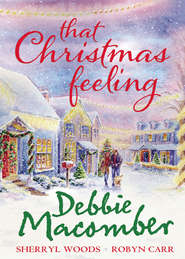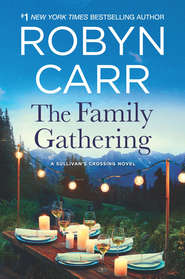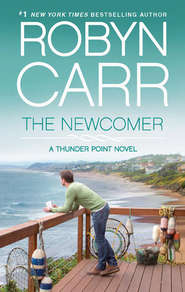По всем вопросам обращайтесь на: info@litportal.ru
(©) 2003-2024.
✖
Wildest Dreams
Настройки чтения
Размер шрифта
Высота строк
Поля
“I asked Cooper who you were and he said you were racing in Australia and I looked you up.” He shrugged. “You have a pretty good record.”
“Thanks,” Blake said, raising a brow in question. In fact, he had a great record. “What else did you find out about me?”
“Well...you had to teach yourself to swim.”
“That’s right.”
“How’d you do that?”
“The same way I learned almost everything— survival. I fell in a pool. Or maybe I got pushed in, I can’t remember. And I couldn’t swim. Went down like a rock.”
“Did you have to get rescued?”
“Nope. It was in college and I was at a pool party. I don’t think anyone was paying attention. I held my breath and walked out. My lungs just about exploded.”
“You walked out?” Charlie asked, astonished.
“That was my only option at the time. I was an expert on depth because I couldn’t swim. Every time I was near a pool I made sure I knew where the shallow and deep ends where. I fell in the middle, eyeballed the shallow end and walked. It was slow. Nobody knows the depth and contour of a pool like a kid who can’t swim. Then I taught myself to swim because walking out in water over your head isn’t a good experience. I read about swimming, practiced it. I watched some video of little kids taking lessons.”
“That pool you walked out of wasn’t that big, I guess.”
“Any pool when you’re in over your head is big. After that I learned to tread water and then, since I knew nothing, teaching me to swim was kind of easy—there were no bad habits to unlearn.”
“They start you out with a life jacket?” Charlie asked.
“Nah, that’s not the best way to learn to swim. Best way to stay alive if you have an accident, though. Even experienced swimmers will wear flotation jackets under certain circumstances. The best way is to learn to respect the water, learn the moves, breathe right, understand buoyancy. They teach babies, you know. They don’t use any flotation devices. They teach them to hold their breath, fan the water, to kick, to roll over on their backs to breathe, to... Hey, you swim, right?”
Charlie shook his head.
“You live on a beach and don’t swim?”
He shook his head again. “I don’t live here. My mom works for Mrs. Banks. Since I come with her to work every day, I’m going to go to school here in town but we live... We live a few miles away.”
“And you don’t swim,” Blake said again.
Charlie shook his head. “That never came up before.”
Blake laughed. He understood that completely. “So, what’s up with Mrs. Banks?”
“ALS. She’s doing good. She’s not end stage,” Charlie said, as if he understood such things. “She still walks a little bit but never alone and my mom is optimistic. But she needs a nurse and it’s not my mom’s first ALS patient. I’m really sorry she has ALS but I think I’m going to like the school... Well, for as long as my mom works for Mrs. Banks.”
“Hopefully a long time,” Blake said.
“Yeah, for her sake, for sure. So what made it a good race? You got beat.”
“Gimme a break, will you? I came in second—that’s a damn good show. Like you said, McGill beats me regularly. This time, though, he announced his retirement.” Blake made a face. “Gonna really miss that guy.” Then he laughed. “Seriously, I had good times. I was close to my personal-best swimming and, in case you haven’t figured it out, that’s not my easiest sport. But I run like the wind.”
Charlie just grinned at him.
“I guess I better come next door and introduce myself to Mrs. Banks, huh? After I clean up, of course. What’s her schedule like?”
“After her nap, right before dinner, everyone is usually around. And she’s downright perky.”
“Everyone?” Blake asked.
“Well, Mrs. Banks’s daughter, Grace, and her husband, Troy, are there. And there’s Mikhail. He’s been hanging around ever since he found out Winnie has ALS. Mikhail used to be Grace’s coach. For, like, years. She’s a champion athlete, too. So you’re not the only one.”
“Is that so?” Blake asked, crossing his arms over his chest.
“Figure-skating gold medalist,” Charlie said. “A while ago, though. She retired.”
Blake frowned. The name “Grace” didn’t sound familiar at all.
“I guess she used to be called Izzy when she was skating.”
“Oh, Jesus, Izzy Banks?” he asked. “You’re kidding, right?”
“And her mother—Winnie Banks,” Charlie said. “Grace is like a second-generation champion.”
Now, what were the odds? Blake asked himself. Winnie and Izzy were famous mother/daughter skating icons. Winnie Banks had quit skating to marry her coach and they’d produced one of the best known women’s figure-skating champions in the world. “Unreal. What’s she doing now?”
“Well, she owns the flower shop and she’s having a baby,” Charlie said. “Troy is a high school teacher. And in that house there,” he said, pointing to the house between Winnie’s and Cooper’s, “Spencer and Devon live there. Spencer and Cooper have a son together.”
Blake’s eyebrows shot up. “Is that so? Two men?”
Charlie laughed. “Not like that. One of them is the dad and one is the stepdad or something like that. I can’t figure out which is which, but Austin’s mom died a couple of years ago. Now Spencer is married to Devon, and Cooper is married to Sarah. And Austin has two bedrooms.”
After all the house and community shopping Blake had done he’d managed to somehow land in a neighborhood where kids had moms, stepmoms, dads and stepdads, missing moms and so on. Where he grew up in Baltimore it was like that, but usually someone in the family was in jail and there sure weren’t any three-story houses on the beach or champion athletes hanging around. Just gang members, drug dealers, prostitutes and pimps. There were missing parents, dead parents and foster parents, kids raised by aunts, grandmothers and neighbors. Families of every creative invention, now that he thought of it. Back when he was a kid, you practically needed a chart to figure out who belonged with whom. He was always a little surprised when folks who could pay the rent had similar family trees.
No beach houses where he grew up, no, sir. He was raised to the age of thirteen in an urban tenement slum in a city that got so freaking cold in the winter he hung out with vagrants who built fires in trash cans under the tracks and bridges. From thirteen to sixteen he bounced around a lot while his mother tried to get her life together, but at least he went to school regularly. That turned out to be critical. An education was the thing that ultimately got him out of a neighborhood where a lot of young men and women lost track of their lives.
“What do you do on that computer besides research your neighbors?” Blake asked Charlie.
“I look up everything. Anything I can get for you?” he asked. And then he grinned the cutest grin.
Blake had a real soft spot for kids. All kids. But he didn’t worry too much about this type, the kind of kid who grew up in places like brand-new, pricey, three-story beach houses with famous retired athletes. He was more concerned about the kids who had tough, deprived childhoods. He’d been working on a project for the past several years meant to serve kids in need and he was nearly ready to unveil it as soon as he had a couple more corporate sponsors on board.
He liked Charlie right away. He felt privileged that he’d be seeing him around. “There is something you can do for me. I have to get on the bike and do at least fifty miles. Then home and clean up.” He looked at his watch. “Any time after one o’clock that your mother thinks is okay to come over and meet my neighbors, could you let me know?”
“Could be closer to dinnertime if you want to meet them all. Troy has been helping Grace at the shop.”
“I don’t want to impose on dinner—just a quick hello. I’m home the rest of the day,” Blake assured him.
* * *
It was not strictly required that Lin Su wear some kind of nurse’s uniform, but she wore clean scrubs every day just the same. For one thing, they were easy to move around in and her job sometimes found her on her hands and knees digging around beneath the bathroom sink or wiping up a kitchen floor. For another thing, scrubs were easily maintained and, if need be, replaced. And importantly, they identified her—even the UPS man at the door knew she was either on the job as a medic or worked somewhere nearby as medical personnel and was dressed in her work clothes.
As a home health care nurse, she could wear civilian clothes while tending patients like Winnie Banks, those who needed assistance and yet were not desperately ill. But when she tended patients in the end stages of diseases, which tended to be incredibly messy, her civilian clothes needed to be spared. After all, they were few and carefully chosen.













